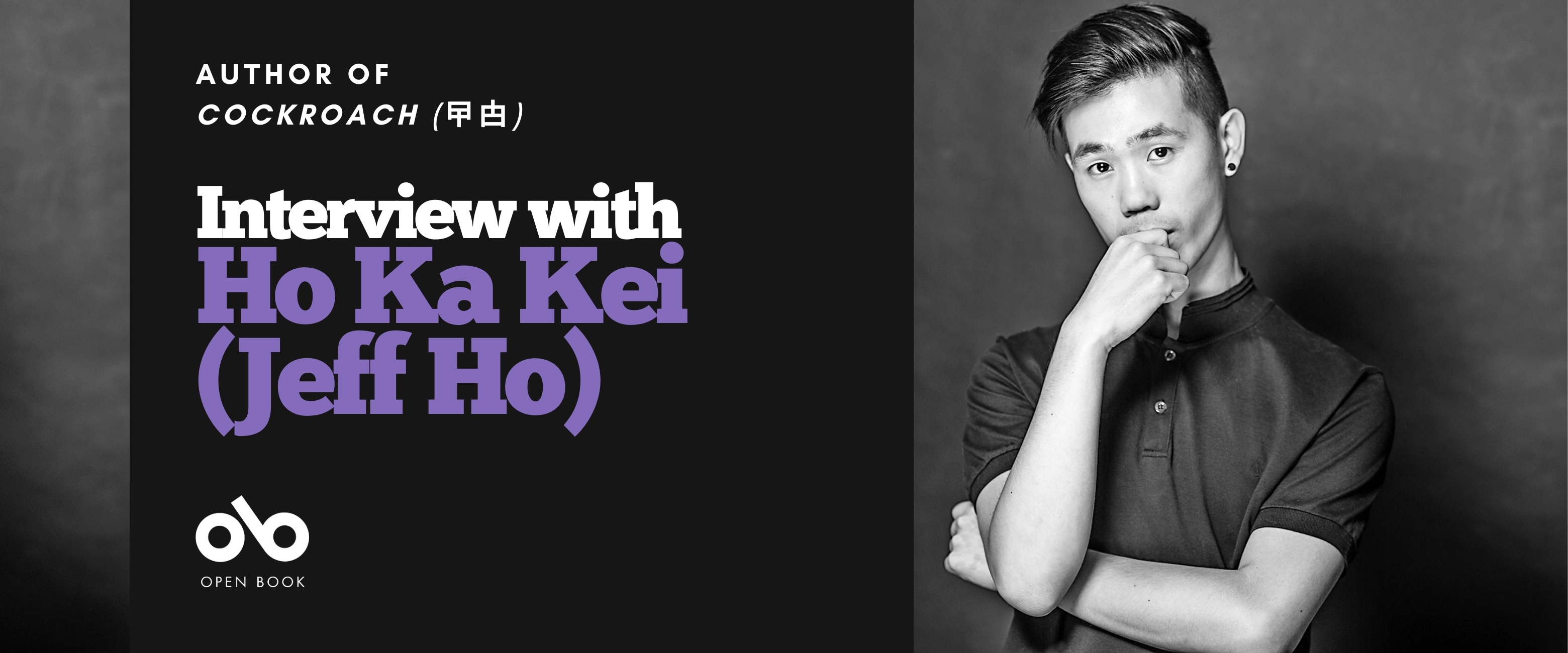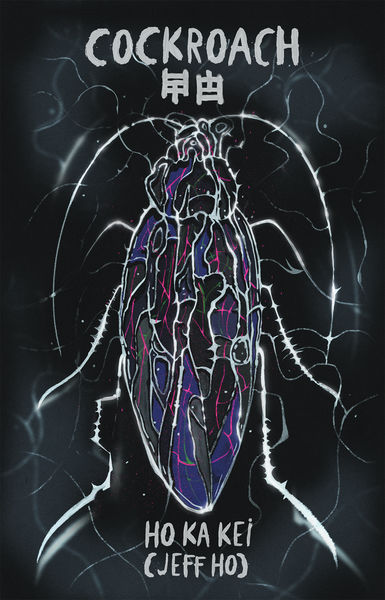Ho Ka Kei (Jeff Ho) Tells a Story of Survival and Being in cockroach (曱甴)
After inspiration struck, Ho Ka Kei (Jeff Ho) took to his phone in the night and spoke the monologue for what would become cockroach (曱甴) (Playwrights Canada Press).
The result was a thought-provoking coming-of-age story about how we find the ability to survive, resist, and overcome, all brought together by an acclaimed playwright with a strong voice and powerful message.
We are thrilled to share this fascinating On Stage: Playwright interview with the author right here!
Open Book:
How did this play first come to life for you? Do you remember the first bit of writing you did for it?
Ho Ka Kei (Jeff Ho):
cockroach (曱甴) started as a monologue that I texted to myself in the middle of the night in Montreal, while staying with my best friend. Okay, rewinding even further: cockroach (曱甴) started as this other project named Whispers which was part of this commissioning program from Repercussion Theatre called Words from Will. It was a double commission that year alongside Erin Shields, a writer that I’m absolutely in awe of. With the support of Artistic Director Amanda Kellock, and support from Playwright’s Workshop Montreal, with then-AD, Emma Tibaldo, I began Whispers around a central question: what would translations of a single Shakespeare monologue sound like if it were orchestrated together like music? Like imagine the percussiveness and staccato of Cantonese, mixed in with legato like French, and they’re all saying “to be or not to be” at the same time… Anyway, I went and wrote a draft of that play, and we workshopped it in Montreal with this terrific cast of multilingual performers, and there was so much generosity and kindness in the room. Then there was this moment where they reflected back to me: before looking at other languages and translations of Shakespeare, looking outward for inspiration… that perhaps I should look inward at my own relationship to the bard as a Cantonese, ESL speaker.
So that evening, back at my best friend’s home, I couldn’t sleep. The keyboard on my laptop is very noisy, and my friend was asleep and I didn’t want to wake her and her partner. So, I whipped out my phone, and I texted myself this monologue of what came to be the third act of cockroach (曱甴). This vomit of words just came right out, and it was this mess of survival, hardship, perseverance, tenacity, humour, and this image of a cockroach.
Shakespeare is like a cockroach – both entities have a lot to say about survival. I started writing from there.
OB:
Was there a question you were exploring in this work, and if so, did you know what it was when you started writing?
HKK:
Recently, Hannah Moscovitch (another writer I am in awe of), was leading this online zoom workshop, and she mentioned the concept of emergent writers and mastermind writers. That idea of writers who discover as they write, and writers who plot ahead and write that out. Generally, I feel like I prefer to organize and think a lot before I set words down. However, with cockroach (曱甴), it was completely an emergent process. I wrote the ending first, then I backtracked and wrote the first part, then wrote act two as a bridge.
Your CanLit News
Subscribe to Open Book’s newsletter to get local book events, literary content, writing tips, and more in your inbox
Through it all, the question that guided the whole thing, no matter how fractured it came out, was: stay and die or leave and live?
OB:
What was the most surprising or memorable moment or experience you had while writing this play?
HKK:
There was a lot of fun research for this play, lots of surprises. There’s an alarming amount of lists in this play, a form that I love to challenge and use in playwriting as lists can feel musical and tangential. There’s this section in the first act of the play that’s a list of how animals are grouped together, say, a family of beavers or a shrewdness of apes or a school of fish. Some of them were so fascinating to consider how it came to be what it is: say, a risk of lobsters or an embarrassment of pandas, or even for humans, a superfluity of nuns or a blush of boys.
Then similarly, there’s a section in the second act that’s just a list of sayings that Shakespeare invented, and it truly was surprising how much of our modern tongue is still influenced by the bard.
OB:
Did the script change in any way once you were rehearsing?
HKK:
Absolutely! Plays always change in rehearsal, I think. Particularly in this production, directed by Mike Payette and choreographed by Hanna Kiel, there was a lot of kinetic and physical theatricality in it. I hadn’t written movement into the script super specifically, and to see how a team of committed and talented artists interpret and marry their own vision to the play inevitably changed (for the better) how the story lands with an audience. And in turn, while working on the book, I reflected some of what was discovered in the embodied production back into the text.
OB:
Are there other playwrights that you’ve been inspired by? What qualities in their work are you most drawn to?
HKK:
Oh yes, I am inspired by so many playwrights and writers across many mediums. Han Kang (The Vegetarian, Human Acts) for her restraint in writing emotionally charged material. David Yee, for incredible, unforgettable sentences. Wajdi Mouawad, for this ability to travel audiences through time and space within the span of sentences. Hannah Moscovitch, for gorgeous characters and sentences and story. Sarah Kane, for shining light on our shadows. Julie Phan, for unapologetic and powerful lines. Judith Thompson, for language that somehow taps into something so deep that I can’t help but feel everything. debbie tucker green, for stage poetry that takes the breath away. So so so many other writers across the globe inspire me.
OB:
Do you feel your work has changed in any way through your writing life and career? If so, how?
HKK:
Oh yes, writing changes as life changes, and as the world changes. As I get older, I feel gratitude more on the surface. I’m really quite grateful for life. It’s an uncomfortable world and time to be alive, and it’s hard to be an artist right now in Toronto. Artists are scrappy and capable and full of tenacity and hope. As I get older, I feel more comfortable writing uncomfortably. Less neat. More life.
OB:
How would you define the role of theatre in society?
HKK:
There’s a study from Lancaster University about how audience’s hearts start beating together at a theatre performance. It’s always stayed with me. Theatre lets us witness ourselves through artifice, so that we may laugh together, or cry together, or allow our hearts to beat together. There are a lot of ways that society asks us to be solitary or individualistic, and theatre asks us to come together as a community. It’s baked into the form.
__________________________________________
Jeff Ho is a theatre artist, originally from Hong Kong. As an actor, he has toured as Ophelia in Why Not Theatre’s Prince Hamlet across Canada and the US for over five years. As a playwright, his works include cockroach (曱甴), Iphigenia and the Furies (On Taurian Land), Antigone: 方, and trace. Jeff is a recipient of the Lambda Literary Award for LGBTQ+ Drama, the Toronto Theatre Critics’ Award for Best New Canadian Play, the Jon Kaplan Legacy Fund Award, has been a finalist for the Playwright’s Guild of Canada Drama Award and the Governor General’s Literary Award, and has been nominated for four Dora Mavor Moore Awards. He is a graduate of the National Theatre School of Canada and currently lives in Toronto.






